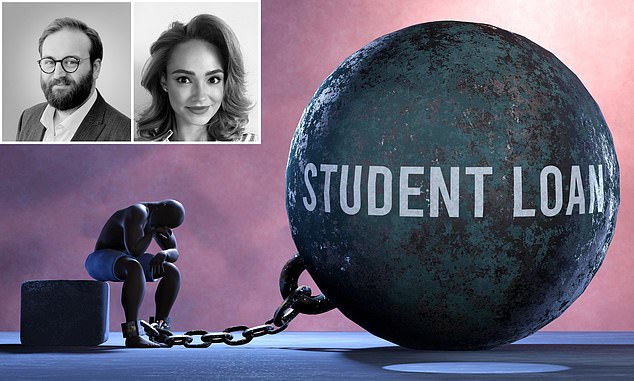I would like some advice regarding my student loan. I only went to university for one year, so I don’t have as much debt as if I had completed the full course.
I went to university between 2017 and 2018, which means I am on the type 2 student payment plan. Currently, the interest is 7.7 percent.
I borrowed £9,000 for tuition and my maintenance loan was around £3,000, but after interest my balance is now £17,792.89. Last year, £1,108.02 of interest was added.
I started my first job on a salary above the reimbursement threshold in July 2023 and have been paying £9 a month, the amount automatically deducted, since then.
I have also been saving for many years and have finally got enough to pay the deposit on my first house. However, I’m now debating whether this is the best use of my money.
> Read: Why financial experts say NOT to pay off a large student loan
Our reader’s dilemma: should they pay off their student debt or buy a house?
I have come up with four options. Which is the best?
1) Postpone buying a house for now and use my savings to pay off my student loan in full.
2) Postpone buying a house and pay a lump sum on my student loan
3) Continue paying £9 a month and buy a house.
4) Overpay when you can, instead of saving money.
> Read: How long will it take you to pay off your student loan on your current salary?
Ed Magnus from This is Money responds: Student loan payments are a problem shared by many young people today.
The problem worsened in 2012, when fees increased from approximately £3,000 to £9,000 per academic year.
The amount you pay depends on your pre-tax income and the loan plan you have. You’ll then pay a percentage of your income above a set income “threshold.”
Those on plan 2 like you, who went to university between September 1, 2012 and July 31, 2023, start repaying your loan once your income exceeds £27,295 a year.
All college students, regardless of what plan they are on, pay 9 percent of their income above the threshold.
The level of interest has been based on the retail price index (CPI) inflation rate rather than the more commonly used consumer price index (CPI).
Fortunately, when the CPI jumped to 13.5 percent in March 2023, the Government introduced a limit of 7.6 percent for all loans. However, this is a very high interest rate, and certainly more than what you can currently earn with a savings account.
Understandably, to prevent more interest from accruing, it would be ideal to pay it off sooner.
But if that means delaying the purchase of your first home, it complicates things quite a bit.
While student loan interest can add up, home prices also tend to rise over the long term, meaning delaying your home buying plans could also end up costing you more in the long run.
For expert financial advice, we spoke to Holly Tomlinsonwealth manager financial planner, Quilter and Jack Mundaypartner and chartered financial planner of the wealth manager Saltus.
What the experts say…
Holly Tomlinson responds: Although this question refers specifically to a student loan, it represents one of the most frequently asked financial questions: should I pay off debt or buy a home?
Many people face the difficult situation of not being able to save for a home, without having to take on the additional burden of increasing student loan costs.
As a general rule, as financial advisors we are taught to analyze client needs in an order of priorities, with debt being the first need to address in an ideal world.

Expert: Holly Tomlinson, financial planner at wealth manager Quilter
In reality, many people view property as their most important financial desire. Not only does it put you on the growing real estate ladder, but it also eliminates the possibility of paying rent, which many see as money wasted.
It is important to remember that a student loan is not like other types of debt.
For example, a student loan does not appear on your credit score, although it may affect mortgage affordability.
Likewise, depending on the plan you have, the debt will be paid off after between 25 and 40 years.
When deciding which path to take, looking specifically at the options you’ve presented, I would consider the following:
1) Postpone buying a house and pay off the student loan in full: This is a fantastic option to stop paying interest on a debt that won’t go down.
Especially since the interest rate on the loan is higher than the current average percentage growth of general cash savings accounts and the percentage growth of property over the last 12 months.
2) Postpone buying a home and pay off a lump sum loan: If you have the funds to pay off this student loan in full, then this is a sensible option, as money deposited in a cash savings account is unlikely to earn enough interest to offset the 7 percent interest charged to the loan.
However, if only a partial payment can be made, this would still make sense considering the same theory.
3) Continue paying £9 a month (or overpay when you can) and buy a house: Applying the same theory discussed above, paying off your student loan as soon as possible would benefit you more in the long run, although this might mean putting your home-buying dreams on hold for the time being.
One caveat that is wise to keep in mind is whether you would be paying rent instead of a mortgage if you didn’t buy a property and pay off the loan.
If so, it is important to consider how much the rent would be and the “wasted” money that would apply in this case.
It is then possible to determine what would be better on a monthly basis (renting or owning) and whether purchasing the home first and paying off the student loan second would work better from a financial standpoint.
Jack Munday responds: The most interesting thing about this scenario is that it highlights the importance of behaviors and emotions when identifying one’s own objectives and drivers.
In this situation, there is a crossroads between paying off student debt or taking on mortgage debt.

Expert: Jack Munday, partner and chartered financial planner at wealth manager Saltus
They are both forms of debt, but the fundamental difference is what is perceived as “good debt” and what is considered “bad debt.”
The concept that student loans are “good debt” is often because they are designed to provide a platform for improving job prospects and income.
There is also a common belief that student loans do not affect your borrowing capacity; However, this is a red herring.
It’s true that student loans don’t show up on your credit score unless you’re late on payments, and this is one of the most important factors in a mortgage.
However, payments will be factored into the mortgage lender’s affordability calculations, and at the end of the day, almost all financial goals and decisions come down to affordability.
We don’t know enough about the situation yet to consider the best outcome, but it is important to consider:
The reason these factors are important is that mortgage debt is static, while student debt has a set payment schedule.
Payment plan 2 means you don’t pay until you earn more than £27,295 a year. After that, 9 percent of your salary above this level will be deducted, sometimes called a “flat tax.”
Another thing to consider is whether the individual might take a career break in the future. If they did, student loan payments would stop but mortgage payments would continue.
Paying the interest on any loan will always ensure that the final balance is paid off faster. However, the mortgage vs. student loan debate will always be based on the individual’s long-term goals and how they feel about the debt.
You should speak to a professional to discuss this and get advice specific to your circumstances.
Some links in this article may be affiliate links. If you click on them, we may earn a small commission. That helps us fund This Is Money and keep it free to use. We do not write articles to promote products. We do not allow any commercial relationship to affect our editorial independence.


